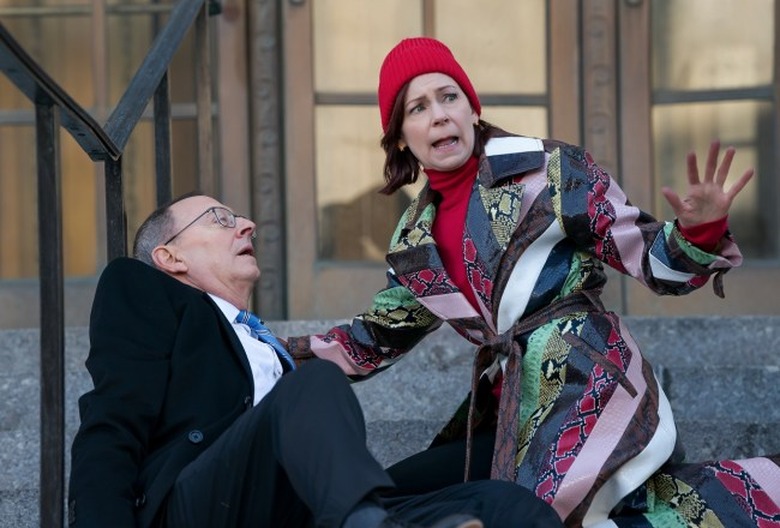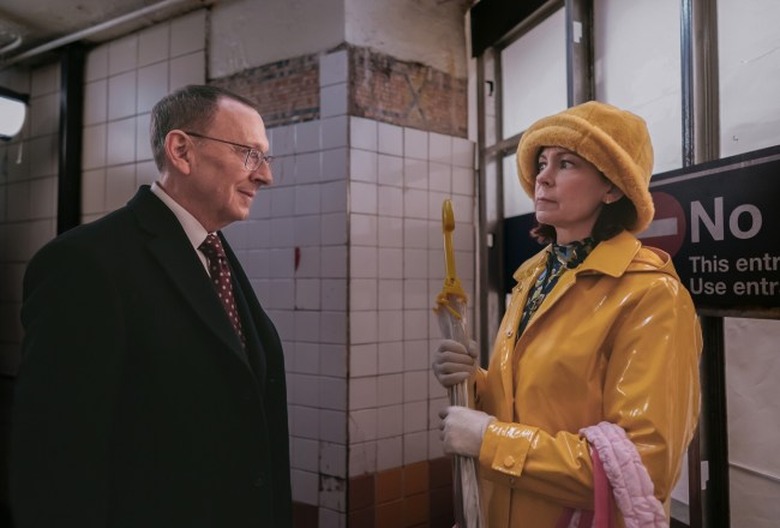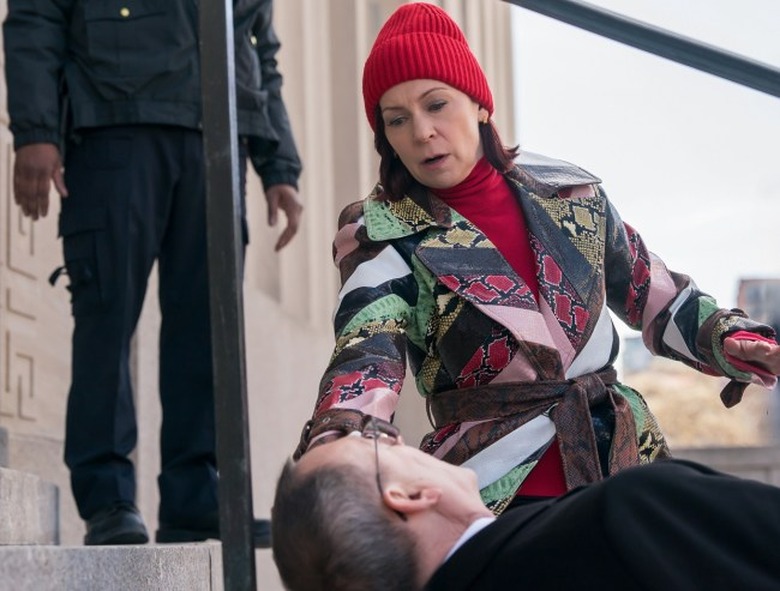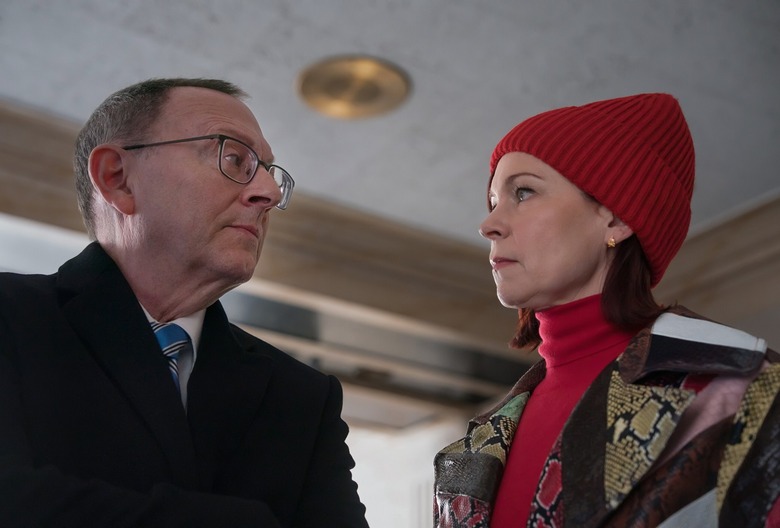Elsbeth's Michael Emerson Talks Judge Crawford's 'Shakespearean' Downfall, Teases 'Lighthearted' Tone Ahead
Warning: The following contains major spoilers for this Thursday's Elsbeth. Proceed at your own risk!
Elsbeth featured not one but two bloody crime scenes during this week's episode, which started off by unveiling Judge Milton Crawford's disturbing backstory.
As a young man, Milton, his friend Andy and a beautiful local girl named Sherry broke into a country club pool where Milton's family were members. Milton convinced Andy that he was a third wheel, so he left, unbeknownst to Sherry. But when Sherry rejected Milton's advances, he killed her... just before Andy returned and witnessed the bloody mess. Milton convinced Andy to keep quiet, helping him to get into an Ivy league university. However, adult Andy, eventually, reached out to the Senate Judiciary Committee via Delia's phone, which is why Milton murdered him earlier this season.
Elsbeth and Wagner set about trying to prove this theory, even making a visit to the country club, but the judge was always one step ahead of them, getting rid of DNA evidence before they could test it. So Andy's lover Delia took it upon herself to do something, shooting and killing Crawford right in front of a horrified Elsbeth just moments before his confirmation hearing.
Below, actor Michael Emerson reflects on his character's "Shakespearean" fate, opens up about filming his death scene opposite his real-life wife/Elsbeth star Carrie Preston, and teases what's ahead for the show in the wake of Crawford's demise.
TVLINE | When you first started playing Milton Crawford, did you have any sense that this is how his story was going to end?
I did not. I figured it would come to an end. I figured that justice would prevail or Elsbeth would prevail, but I had no idea in what way. I never dreamt that it would be in such a fateful sort of Greek way. So it was really satisfying when I got that final script and I saw how things were ending. I thought, "Oh, this is really good stuff."

TVLINE | As soon as Delia said she had nothing to lose, I was like, "Oh, that's bad news."
[Laughs] Right? So good, and it's a kind of roundabout and indirect justice that has something satisfying about it. She's going to go down. This is the end of Delia's life as a free person, and the death of the judge is, obviously, going to be misconstrued, misunderstood. The truth of who he really is may never see the light of day, but something put the universe back in order, at least.
TVLINE | It sounds like you think Crawford got what he deserved, in the way he deserved it.
Well, I don't see how he was ever going to be called to account. It was never going to be by way of his own conscience. He was never going to be haunted. He wasn't going to have nightmares in his lonely bed late at night. That wasn't the way for him, because he hasn't enough humanity in him, I think. And who knows what damage a man of his character, his true character, could inflict if he's a powerful judge. The whole history of Good Wife, Good Fight and Elsbeth is there's a yearning for imperfect justice in all those shows. So I feel like it's consistent with the mission of [creators Robert and Michelle King], really.

TVLINE | Crawford said he's always one step ahead, and it certainly seemed that way in this episode. Elsbeth was never quite able to get justice through the legal system. Did he need to die? Did he need to be killed? Was the law just not enough to take him down?
Well, I guess that's not probably for me to say, and maybe there was some other way, some slower grinding of the wheels of justice that may have, eventually, brought him low. But in this dramatic moment, when her resources seem diminished and his victory seems secure, there's something satisfying about the Biblical or Greek turn of events happening more swiftly, suddenly, and decisively than any court ever can.
TVLINE | Kaya says even in death, Crawford wins. Do you think he would be happy to know that he's being presented as a martyr in the news?
Oh, sure! Because he clearly was a creature so full of self-regard, so full of hubris. He always wanted things named after him. He always wanted his name on a banner. He always wanted a bridge named after him or the lawyers' lounge at the courthouse or something. So to go to his grave with his dark secrets unrevealed and his reputation intact would be some small comfort in his afterlife.
TVLINE | As far as an almost last line goes, "The world rewards might, and I am a mighty man, indeed," is such a great one to have before a death scene.
Right? It's a lot. It's a lot for a person to say to another person. It tells you something about him. It tells you about his sense of exaltation, untouchability. The day is his. It's Shakespearean, his sense of victory, and as learned from the ancients, it can be pulled out from under your feet still.

TVLINE | What did Carrie think of your death scene? And what was it like for the two of you to shoot it?
You know, that kind of a scene, it's all about logistics. Part of your brain is playing the scene, but part of your brain is, "Where's the camera? Can the camera see me over the shoulder of Delia? Or is the gun in my face? Where am I looking? How am I going to fall and not hurt myself?" And it's a whole lot of little factors. It's the usual juggling act that goes on in an actor's brain when you're shooting an important scene like that. A whole bunch of little things have to add up right so that it seems smooth and real and believable. But it was good shooting, and I was surprised at the tenderness with which our dear Elsbeth responded to injury of another, even a despicable, adversary. She still encourages him to hold on. So sweet.
TVLINE | From speaking to both you and Carrie, it sounds like this was a very good working experience for the two of you. Did you wish that they had maybe just arrested him so you could, potentially, pop back in and out throughout the seasons?
No, I think we sort of had our fun, and we didn't want to go on and make this, like, a family responsibility with logistics juggling forever. It's nice to have done this, to have done it successfully, I feel, and then to move on, to let Elsbeth go back to that more lighthearted thing that she does so well. I'm not saying there won't be dark characters, but this seemed like the right amount.
TVLINE | She's really shaken, though, when Crawford is shot, and we see her kind of have a crisis of faith towards the end of this episode. How do you think his death is going to impact her?
I think it'll always be a thing that she wished had ended differently. I think she believes in her heart that, given enough time, she would've brought him down through conventional police work.
TVLINE | You have a direct line at home to the show. Did you ask Carrie, "What happens after this episode"?
They moved onto some more theatrical or lighthearted kinds of tones in the closing episodes of the season. So stuff that's a little more fun and a little less troubling.
TVLINE | It's so awful watching that opening act and seeing what he did as a young man.
Yeah. I haven't seen it, nor have I met the young man [Ethan Dubin] that plays the young Judge Crawford, but I hear he's quite brilliant.
TVLINE | That was actually what I was just about to ask you, because watching it, it was so eerie. He nailed your voice.
Oh, good. Oh, I can't wait to see it.
TVLINE | I was very impressed.
That's some good homework on his part, then.
Elsbeth fans, what did you think of the episode? Hit the comments!
